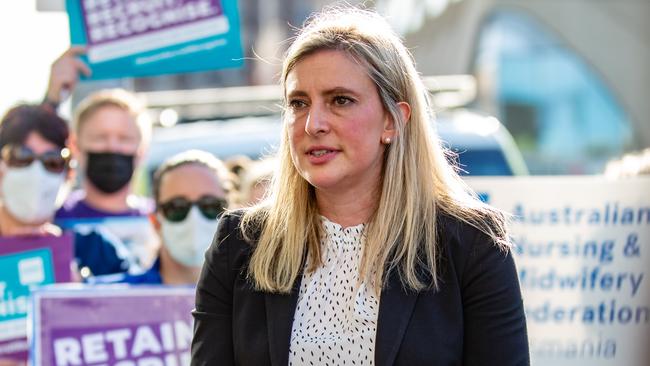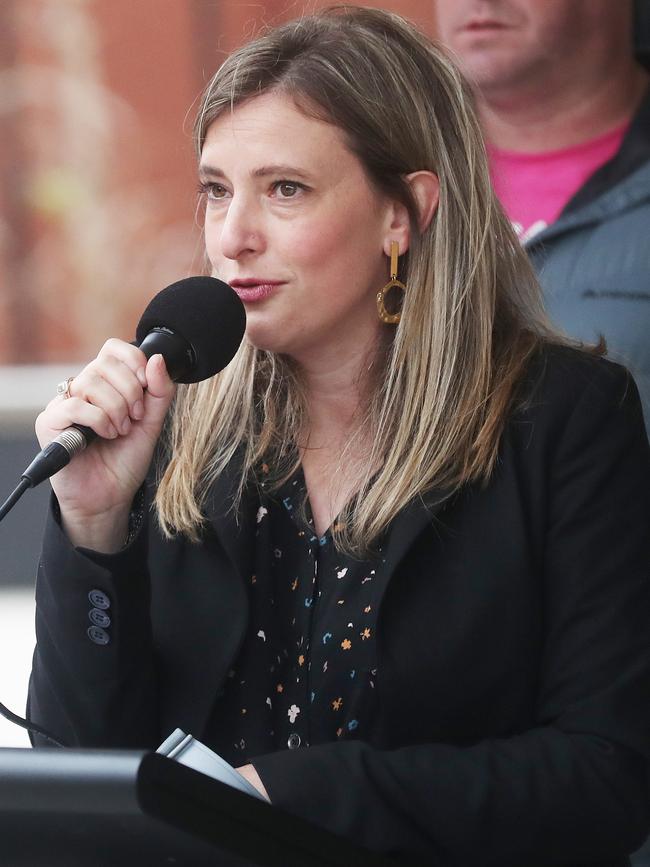‘Significant milestone’: Tassie doctors’ new pay deal a relief
Tasmanian doctors are “relieved” after accepting a new pay deal from the state government, ending protracted negotiations and making the state more competitive in the race to attract and retain medicos in the public hospital system. LATEST >>

Tasmania
Don't miss out on the headlines from Tasmania. Followed categories will be added to My News.
Tasmanian doctors say they are “relieved” after voting to accept a new pay deal from the Rockliff government, ending protracted negotiations and making the state more competitive in the race to attract and retain medicos in the public hospital system.
Members of the Australian Medical Association (AMA) Tasmania voted overwhelmingly to accept the latest offer to salaried medical practitioners (SMPs), with 98 per cent backing the deal.
The new enterprise bargaining agreement includes pay rises every 18 months, similar to the pay cycle for Victorian doctors, as well as allowances rolled into base salary packages.
Doctors will receive a 3.5 per cent salary increase from the first full pay period commencing after July 1 this year and an additional 3 per cent raise effective from the first full pay period beginning on or after January 1, 2025.
They will also be provided with a $1000 cost of living payment, similar to those included in other public sector pay deals.

AMA Tasmania and Tasmanian Salaried Medical Practitioners Society lead negotiator Dr Michael Lumsden-Steel said the agreement marked a “significant milestone for Tasmania’s health care sector” and would “improve health care services for Tasmanians”.
“To say that we are relieved is an understatement — to have achieved such a sensible, comprehensive and sustainable investment into the SMP workforce means we can now recruit and retain competitively with other states,” he said.
“The government’s decision to recognise the needs of a multicultural and flexible workforce is commendable and supports a modern approach to health care.”
Dr Lumsden-Steel said the new agreement worked “within the government’s parameters” and had demonstrated “tremendous foresight and finally draws a line in the sand and enables us to roll up our sleeves and set about rebuilding our workforce”.
“We know we need more doctors and improved systems to address the waiting lists for specialists in outpatient clinics - and this agreement will help,” he said.
Improved conditions provided for in the agreement include new leave entitlements and structural changes for doctors in training, touted as a key incentive to attract and retain young doctors to the state.
Premier and Health Minister Jeremy Rockliff said the deal with the AMA was the result of “months of positive, productive discussions”.
“We are always committed to delivering fair and reasonable wage offers, and I commend our doctors for their willingness to enter into genuine, good faith negotiations,” he said.
As part of the deal, Mr Rockliff said doctors had “committed to implement a range of innovative issues, including criteria-led discharge for patients and digital health initiatives, which supports the government’s strategic priorities”.
The new EBA will need to be approved by the Tasmanian Industrial Commission before coming into effect.
Tassie nurses’ ultimatum to state government over pay
The nurses’ union has delivered an ultimatum to the state government, warning industrial action will occur if a new pay offer isn’t presented to the workforce by the end of the week.
It comes as doctors in the state’s public hospitals are close to finalising a new employment agreement after calling for the government to provide more competitive salaries and conditions so the island could attract and retain junior medicos.
The Australian Nursing and Midwifery Federation (ANMF) had been expecting a pay deal offer for nurses and midwives by last Friday but none was forthcoming, with negotiations having dragged on for months.
“Unfortunately, we are still awaiting a formal offer to take to members despite anticipating an offer over the course of the last two weeks,” ANMF Tasmanian branch secretary Emily Shepherd said.

“ANMF will be writing a letter on behalf of members seeking a formal offer by Friday, July 14 … otherwise ANMF will seek members’ formal endorsement of industrial action.”
The employment agreement covering Tasmanian nurses and midwives expired on July 1. They are due to receive a salary increase, which would come into effect in the first full pay period on or after December 1 this year.
Workers have asked the government for better workplace safety, improved management of fatigue and burnout, and a right to disconnect clause that would prevent employers from contacting staff outside of work hours.
They are also seeking “competitive” wages and conditions, with Ms Shepherd saying “we should at least be at [the] national average because we just cannot recruit”.
A recent survey of ANMF members found that 91 per cent of respondents supported strike action at handover time with increasing length up to an hour until the government made a satisfactory offer.
Ms Shepherd said it was “incredibly disappointing” that nurses and midwives were still in limbo.
“But also [it] is fuelling anger for members who have worked so hard to support the Tasmanian government in keeping Tasmanians safe during the Covid-19 pandemic, returning from annual leave over Christmas when there was not enough staff to keep services running at the [Royal Hobart Hospital], who now just feel abandoned by a government who are supposed to also be supporting them,” she said.
The Department of Premier and Cabinet previously said that while an offer hadn’t been made, negotiations with the ANMF had been “positive, respectful and in good faith”.
“The government is committed to continuing to provide fair, reasonable and affordable increases to salaries and conditions of employment,” a spokeswoman for the department said.





